-
ABOUT US
-
ACADEMICS
Curriculum Program
Departments
- English
- High School Chinese
- Primary and Junior School Chinese.
- High School Mathematics
- Middle School Mathematics
- Primary School Mathematics
- Music and Fine Arts
- Physical Education
- Physics
- Chemistry
- History and Geography
- Physical Science and Optional courses Department
- Middle School Biology
- High School Biology
- Social Sciences
- Computer Science
- Courses in Primary School
Achievements and Matriculations
College Counseling
Science & Technology Innovation Contest
Subject Competition
-
ARTS
-
ATHLETICS
-
AT SHSID
SHSID ∣ TIMES
PTSA
Club Exhibition
- 龙吟社
- Live 2 Drama
- Choir
- Hip-pop Dance Club
- The Primary School Dance Troupe
- Symposiums Club
- Biology Workshop
- You Shan
- VEX Robotic
- Peking Opera Club
- Baseball Club
- Model United Nations
- The World Scholar’s Cup
- Future Problem Solving Club
- United States Academic Pentathlon
- OM Club
- AMC Club
- Music for Patients
- SHSID Gazette
- Smile Charity
- Cultural Moments
- SciAcademy
- Stem Doge Alliance
- Chinese Debate Club
- IAA
- Mock Trial Club
- Zhengming Club
- Furry Friends
- GT-Racing
- Village Radio
- IMMC Club
- Creative Design and Intelligent Fabrication
- Future City Research Project
- ECOCAP
- AdvocaSEA
- SPDC
- Medishine
- Floorball Club
- Animusic MTC
- Wings Up
- All Booked
- Cyano
- Birding Community
Health and Wellness
Campus Safety
Cafeteria Service
-
ADMINISTRATION
-
ADMISSIONS
-
ALUMNI
Alumni Information
Honors Students
- Class of 2025
- Class of 2024
- Class of 2023
- Class of 2022
- Class of 2021
- Class of 2020
- Class of 2019
- Class of 2018
- Class of 2017
- Class of 2016
- Class of 2015
- Class of 2014
- Class of 2013
- Class of 2012
- Class of 2011
- Class of 2010
- Class of 2009
- Class of 2008
- Class of 2007
- Class of 2006
Who Studied at SHSID
SHS Foundation
-
DOCUMENTS
Middle School Chinese Department: Non-Native Chinese Language Activities of Chongyang Festival
Amid the sparkling autumn light and the joyous occasion of the Chongyang Festival, recently, the Middle School Chinese Department of the SHSID meticulously planned and carried out a series of Chongyang Festival-themed activities for sixth and seventh-grade non-native Chinese learners. Centered around understanding Chongyang, respecting the elderly, and inheriting cultural traditions, the activities for sixth and seventh graders were designed with distinct focuses, integrating both cultural depth and emotional education. Through these experiences, students gained a deeper appreciation of tradition and learned to express respect through action.
Sixth Grade: Expressing Respect Through Warm Experiences
Under the theme “Love on Chongyang, Conveying Heartfelt Wishes,” sixth-grade non-native Chinese students engaged in three progressively structured sessions, deepening their understanding of Chongyang culture and strengthening their emotional connection to its values.
1.Cultural Enlightenment: Learning About Chongyang
The activity began with teachers systematically introducing the origins, customs, and cultural significance of the Chongyang Festival. Students not only learned about traditional practices such as “climbing heights,” “admiring chrysanthemums,” “wearing cornelian cherry,” and “eating Chongyang cake,” but also studied classic poems like “Thinking of My Brothers on Mountain-Climbing Day.” A follow-up group quiz featuring 16 questions on legends, poetry, and customs sparked lively competition, allowing students to solidify their cultural knowledge through interactive fun.
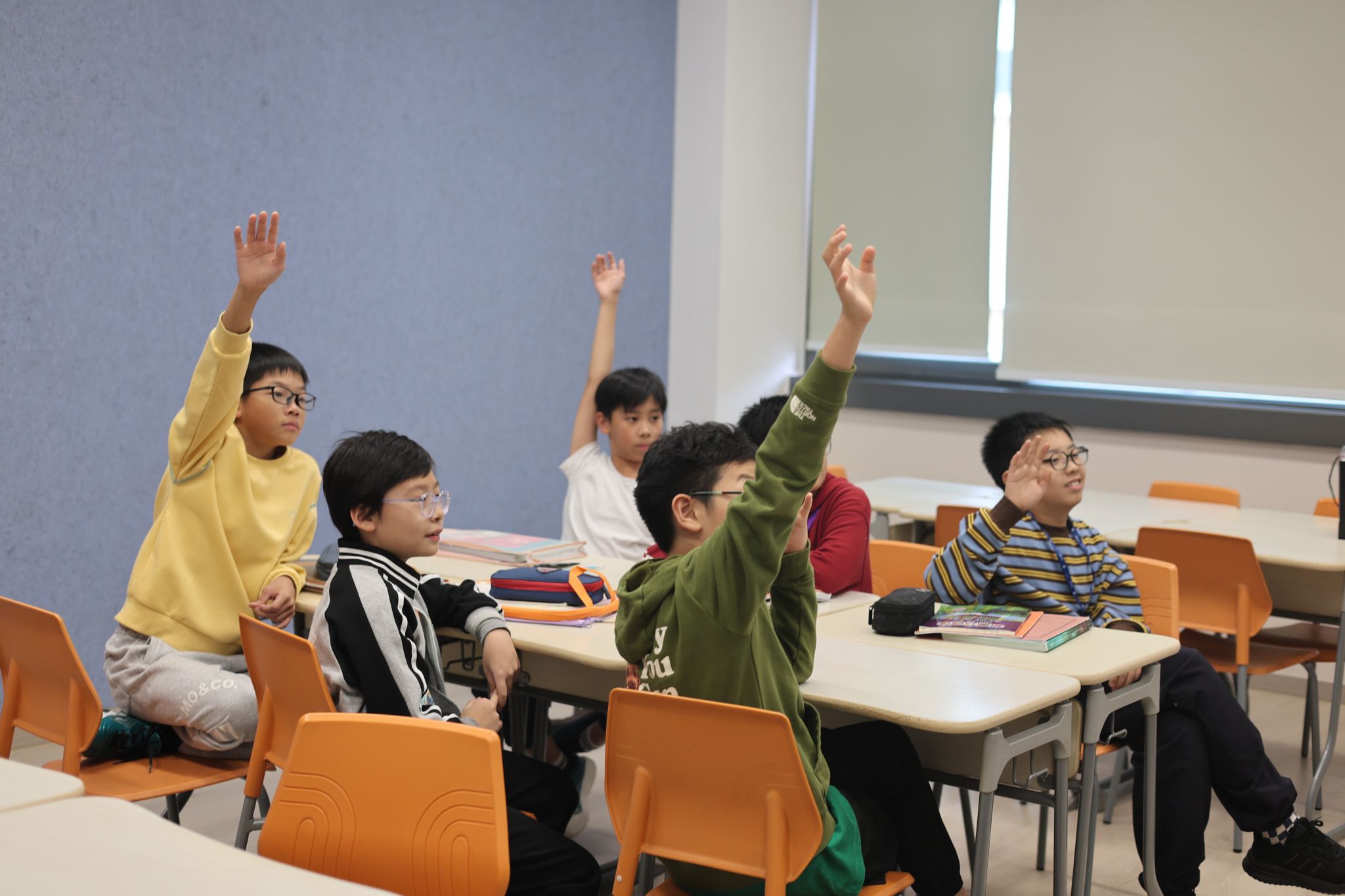
2.Emotional Connection: Shared Reading and Storytelling
During the picture book reading session, students experienced the warmth of family bonds and the power of cultural transmission through illustrated stories. This was followed by a “Grandparent-Child Story Sharing,” where students took turns recounting heartwarming memories with their grandparents and shared touching moments on stage. The activity recognized “Sharing Stars” and “Listening Stars,” and students were encouraged to express gratitude in tangible ways—such as giving back massages or serving tea to their elders at home.
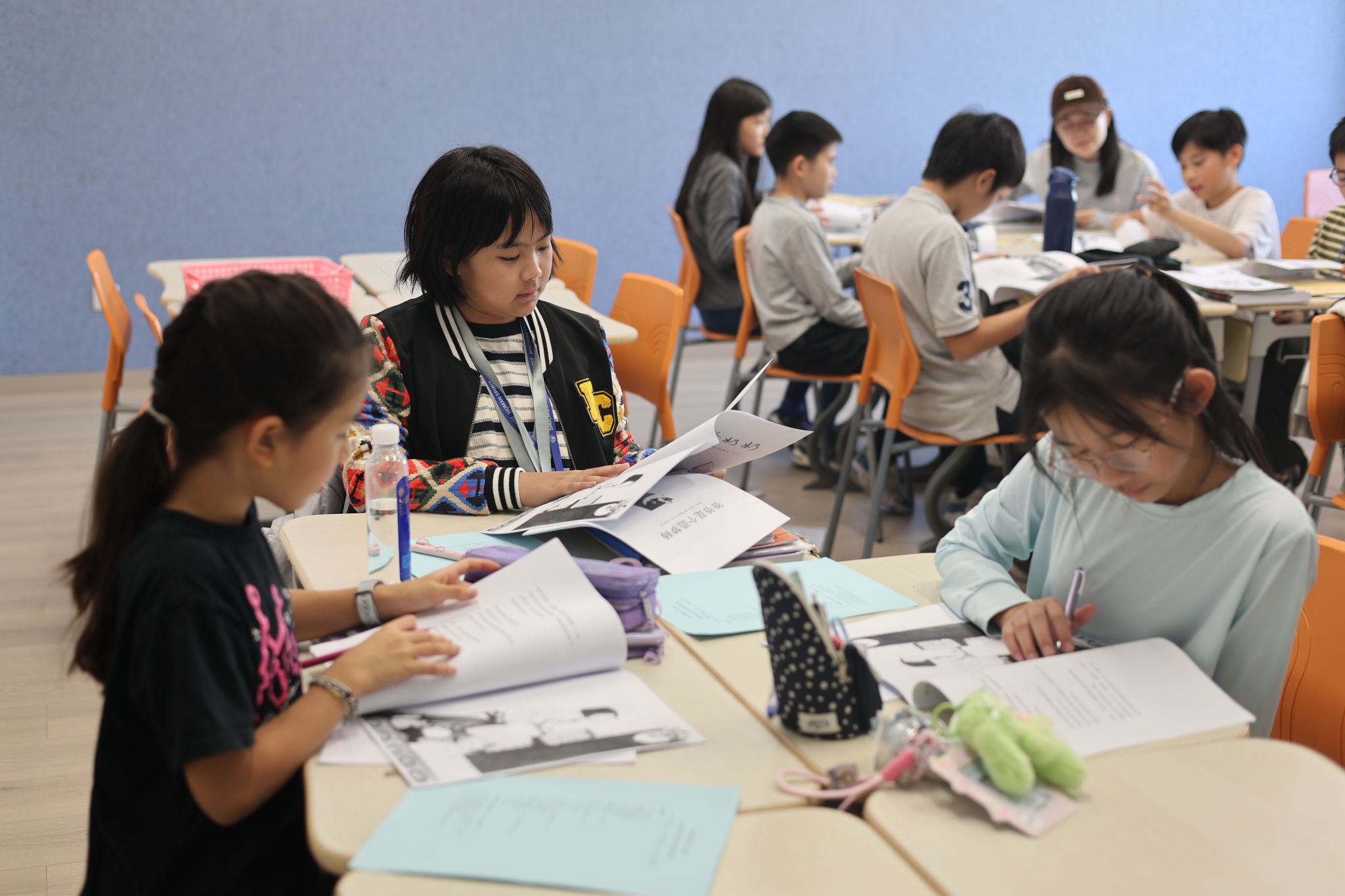
3.Creative Expression: Conveying Wishes in Multiple Forms
As the concluding part of the activity, students engaged in three meaningful tasks: “collage poem creation,” “writing thank-you cards,” and “making tea bags for elders.” They placed their handmade tea bags, creative collage poems, and heartfelt cards into kraft paper bags, presenting these sincere, youthful gifts to their elders during the golden autumn season.
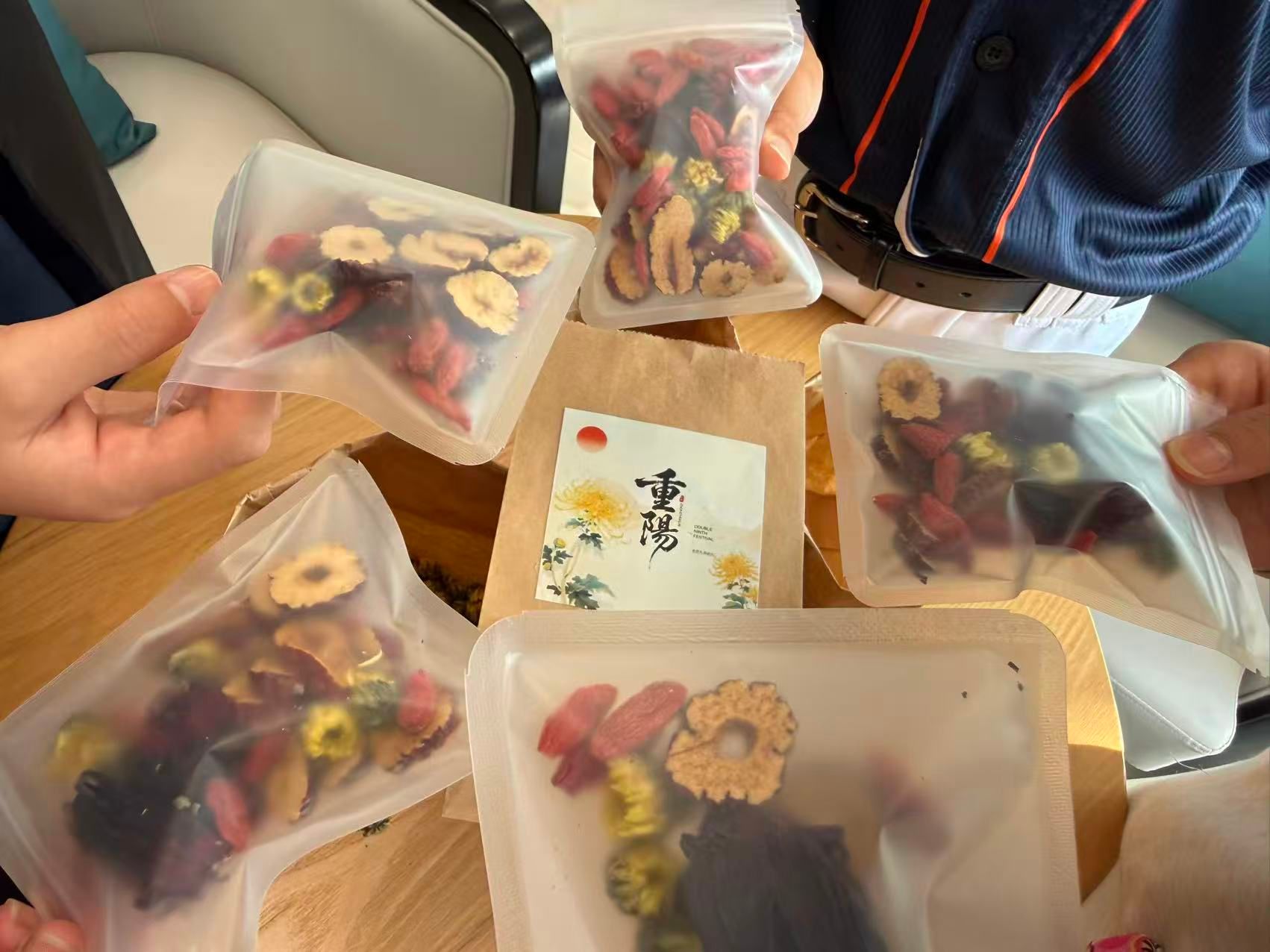
Seventh Grade: Fulfilling the Mission of Cultural Inheritance Through Exploration
Building on the heartfelt experiences of the sixth graders, the seventh-grade activities were further extended and deepened. Centered on the theme “Inheritance and Respect,” four main activities guided students to understand the contemporary significance of honoring the elderly through language learning and school history exploration—progressing from emotional awareness to cultural identification and practical engagement.
1.Words of Respect, Threads of Culture
The activity of writing messages for the elderly—expressing blessings and gratitude—was the first to launch. Students wrote words conveying "respect" and "good wishes," accompanied by pinyin and English explanations. Through language learning, they expressed their reverence for teachers and elders.
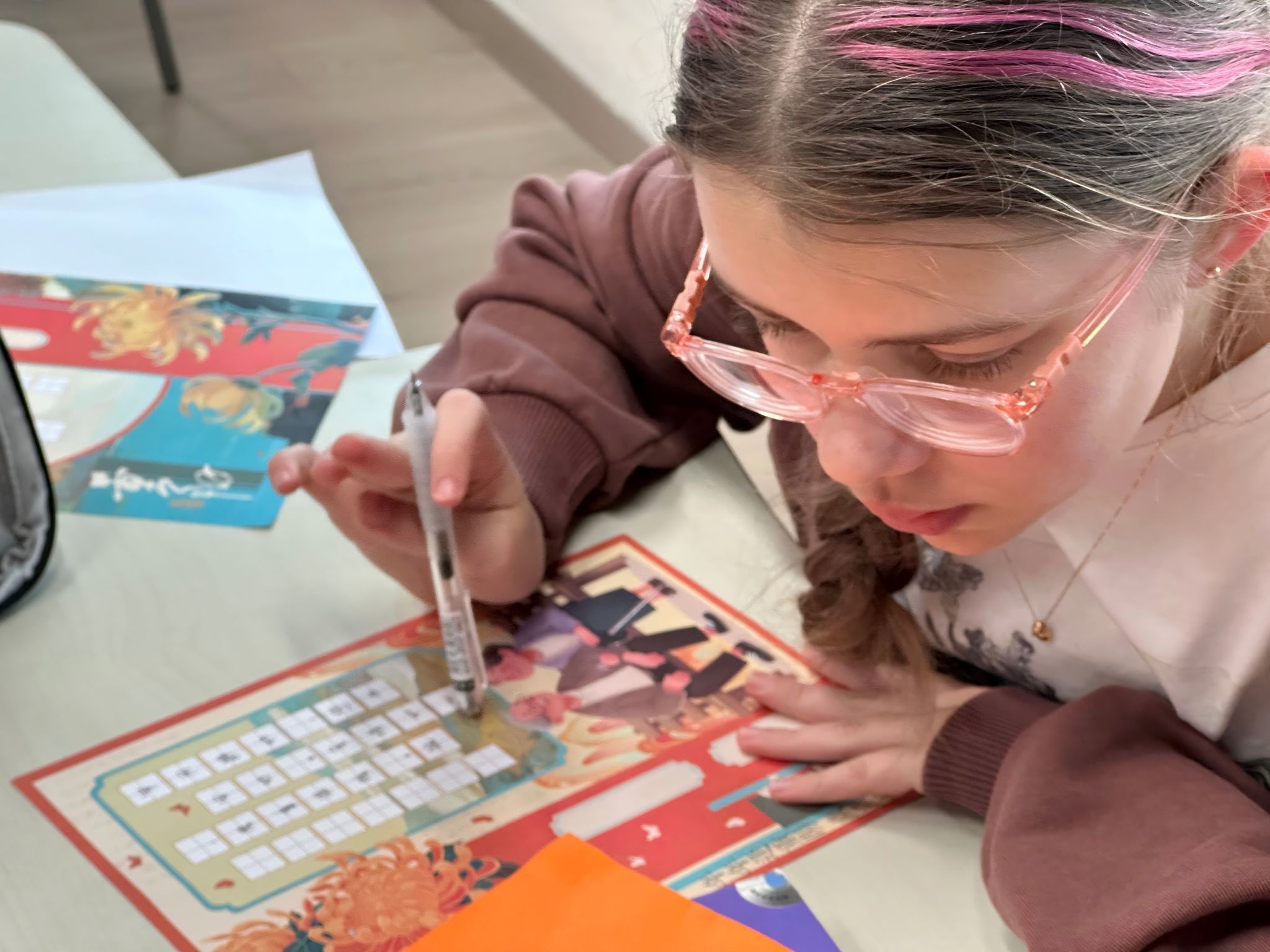
2.Corridor of Time: Tracing the Footsteps of Predecessors
The following day, students visited the school history exhibition hall to complete two tasks: “Searching for Stories of Elders” and “Drawing a Timeline Map.” They traced the inspiring stories of former students and teachers through aged photographs and documents, and marked key milestones of the school from its founding in 1865 to the present. This allowed them to deeply appreciate the continuity of educational endeavors and the value of “honoring teachers and upholding their teachings.”
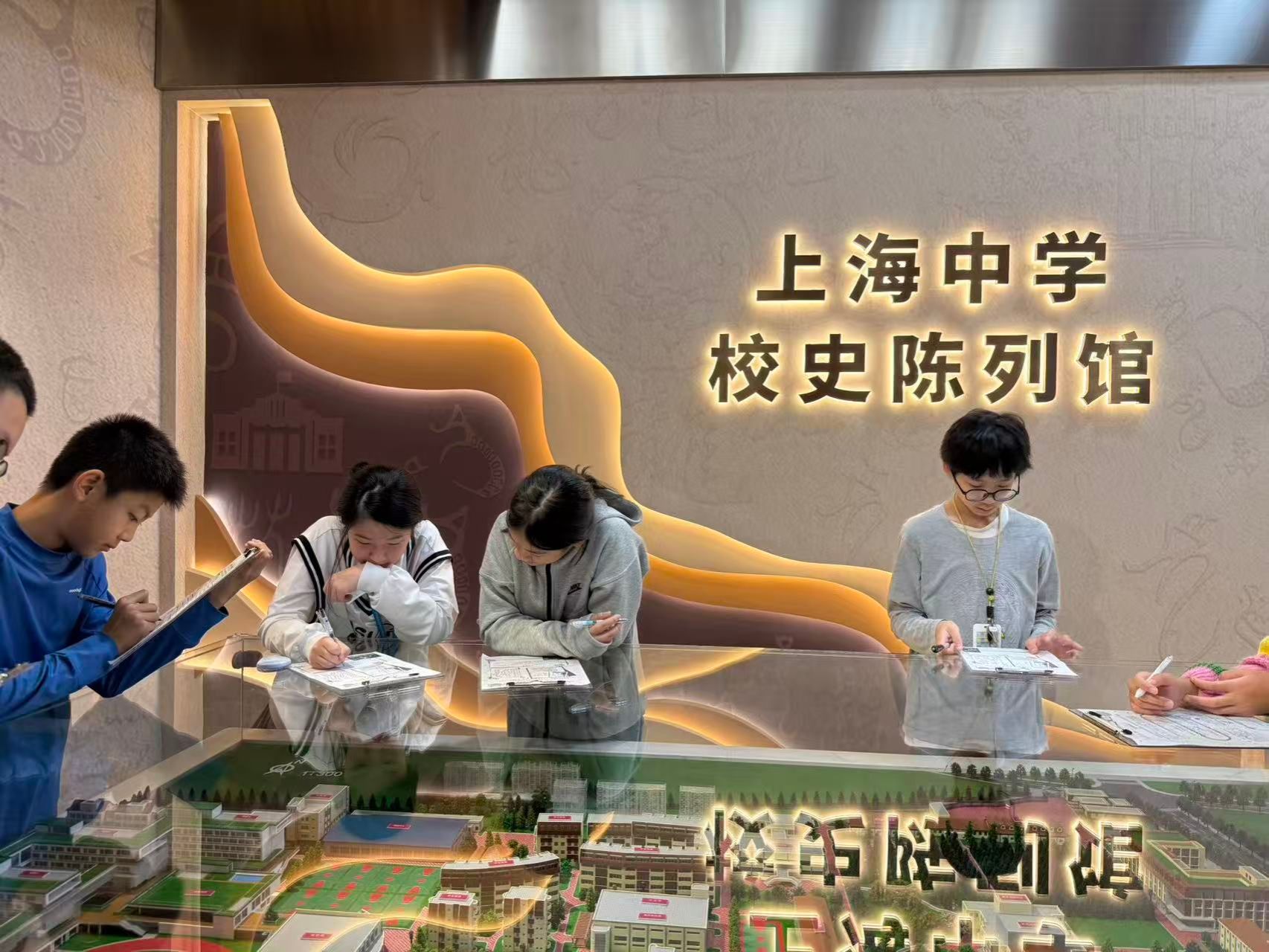
3.Intergenerational Dialogue: Listening to Stories Across Time
On October 31st, students brought interview guidelines home to listen to their grandparents’ school memories. Later, during a class sharing session, they recounted these stories in Chinese, supported by drawings and photos. These cross-generational school stories took on new life through the voices of the young, becoming cultural bridges that connected different eras and emotions.
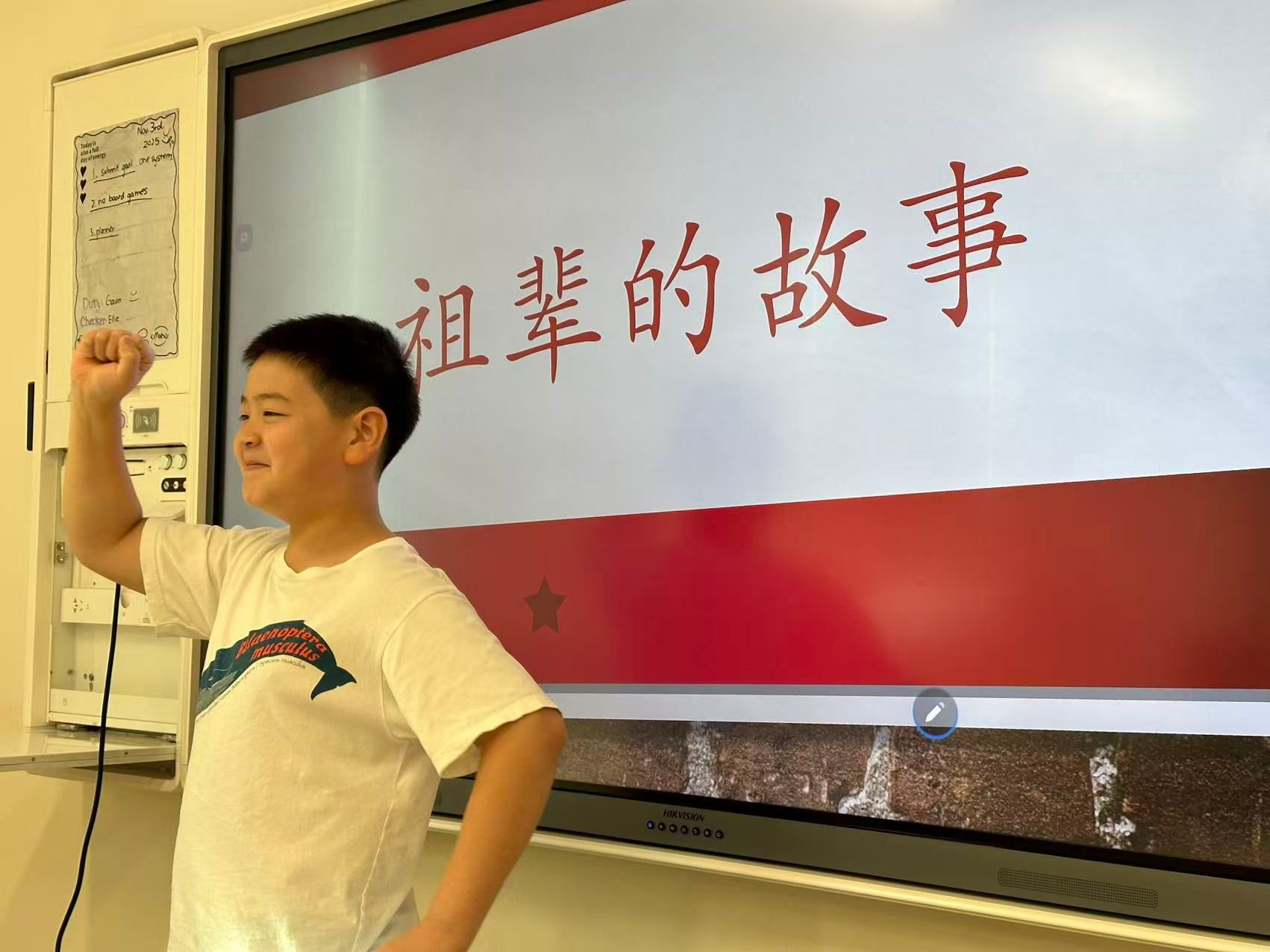
4.Time Capsule: Wishing for a Bright Future
On the same day, students wrote messages to their “future selves” or “future students,” expressing their wishes for personal growth and the school’s development in Chinese. These letters were sealed in a “Campus Time Capsule,” symbolizing the continuity of culture and the sowing of hopes.
Conclusion
The Chongyang Festival learning and practice series for sixth and seventh-grade non-native Chinese students revolved around the core theme of “respecting the elderly,” forming a complete educational journey—from emotional experience to cultural identification, and from family care to school history inheritance. Sixth graders began to understand the tradition of elder respect through warmth and creativity, while seventh graders deepened their cultural awareness through exploration and reflection. The activities not only enhanced students’ comprehensive language skills and sense of teamwork but also subtly passed down the traditional Chinese virtue of “respecting the elderly,” infusing this golden autumn with profound and heartwarming cultural strength.
(Written by Xinyi Zhang
Pictures by Teachers
Reviewed by Fan Chen, Shengyuan Zhou, Xinyu Ma, Shiyu Wu, Louie Parker)